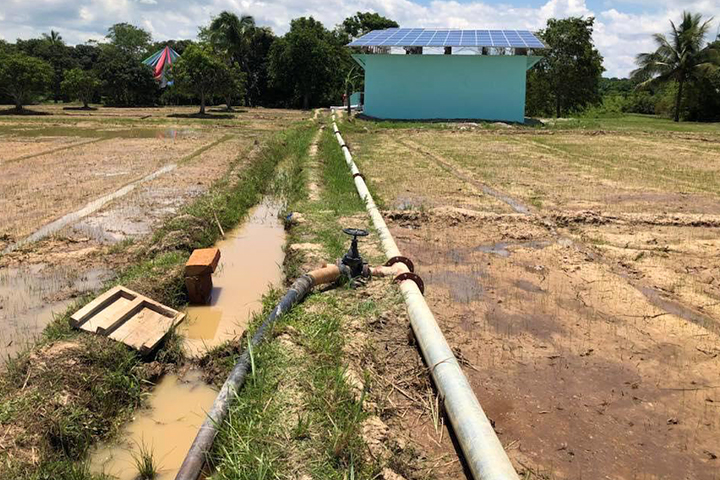News
Agri czar pushes for solar irrigation to boost rice production

SOLAR IRRIGATION. This is the Philippines’ first prototype of the Solar-Powered Irrigation System (SPIS) put up in North Cotabato in March 2017. Agriculture Secretary Emmanuel Piñol is pushing for the adoption in the country of this system, which, compared with the conventional irrigation system, is much cheaper, faster to put up, allows more cropping, and makes rice sufficiency attainable. (Photo from Manny Piñol’s FB page via PNA)
MANILA — Agriculture Secretary Emmanuel Piñol is pushing for the massive adoption in the country of the solar-powered irrigation system (SPIS), which, he said, is much cheaper, faster to put up, allows more rice croppings, and makes rice sufficiency attainable.
He said the conventional system of the National Irrigation Administration at present does not suffice for all of the country’s farm irrigation needs.
“We have land, but the issue is providing water there. So, we must think out of the box,” Piñol said at the Bureau of Soils and Water Management (BSWM)’s 67th-anniversary celebration in Metro Manila on Friday.
Department of Agriculture data showed that of the 3.9 million hectares of rice farms nationwide, only 1.2 million hectares are irrigated.
The bigger 2.7 million hectares depend on rain and the farmers can plant only once a year.
Piñol noted that it took years for NIA to build its conventional irrigation system’s infrastructure, including dams.
This, he pointed out, is why the agency is unable to meet the country’s irrigation needs, limiting the production of rain-dependent farms.
Piñol said the requirement is irrigating 80,000 hectares annually, but NIA can provide water for only about 30,000 hectares a year, resulting in a deficit of around 50,000 hectares.
“It’s impossible to catch up if we just rely on the conventional way of irrigating,” the agriculture czar said.
On the other hand, SPIS can be set up within months. The whole equipment consists of just solar panels that absorb sunlight to
generate electricity for the system, pump and its operating device, water storage facility, and pipes for conveying water to a farm.
Piñol estimates the development cost of SPIS at about PHP105,000 per hectare.
In contrast, he said, NIA’s conventional irrigation systems need as much as PHP400,000 per hectare to develop.
In March last year, the government launched an SPIS prototype in North Cotabato, where President Rodrigo Duterte was a guest. This facility now irrigates 40 hectares of previously rain-fed rice farms, Piñol said.
Another such facility is being launched this month in Nueva Ecija province. This, Piñol said, would enable farmers of Caridad Norte and Sur Irrigators Association of the Central Luzon province to have a second cropping within a year.
Piñol aims to have a total of 117 SPIS built all over the country this year to irrigate nearly 5,000 hectares or rice farms.





















